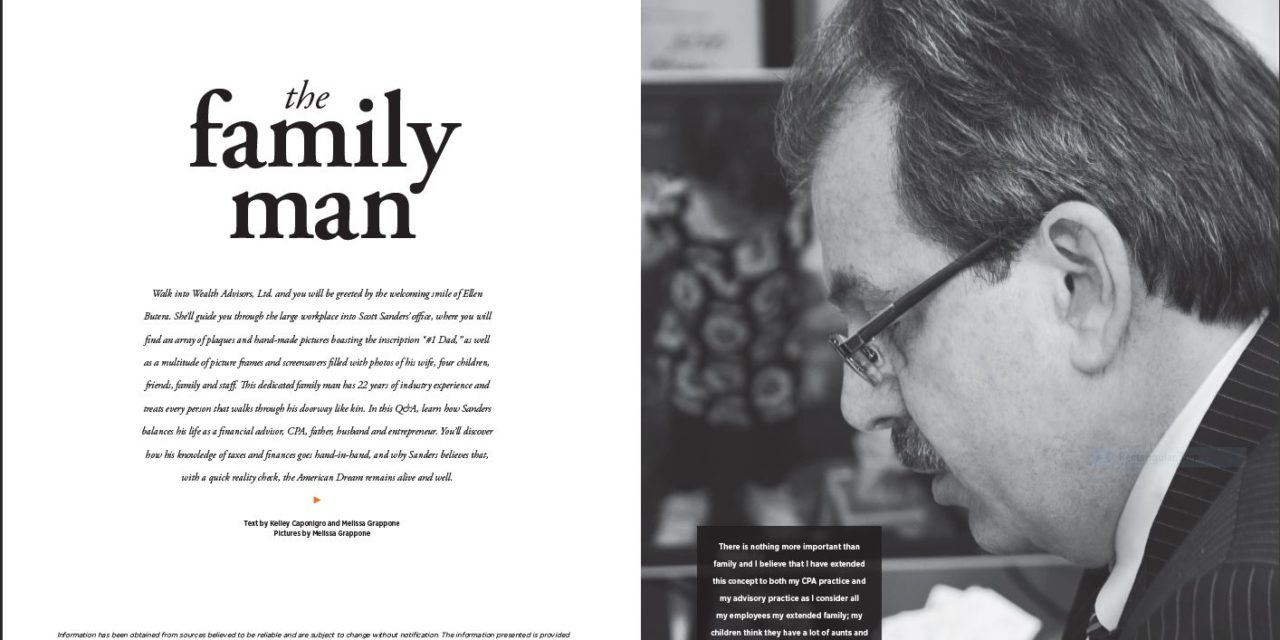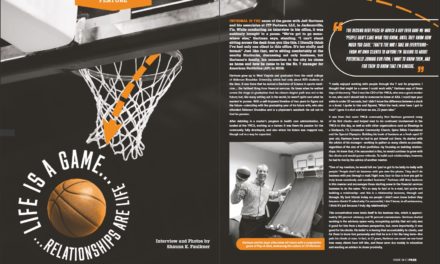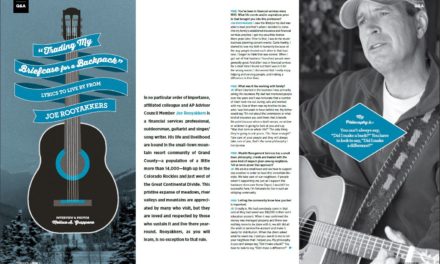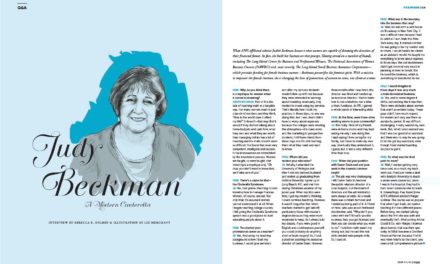
FREE 6.3 Q&A – Scott Sanders
The Family Man. Walk into Wealth Advisors, Ltd. and you will be greeted by the welcoming smile of Ellen Butera. She’ll guide you through the large workplace into Scott Sanders’ office, where you will find an array of plaques and hand-made pictures boasting the inscription “#1 Dad,” as well as a multitude of picture frames […]
To view the full article please register below:
FREE 6.3 Q&A – Scott Sanders
The Family Man.
Walk into Wealth Advisors, Ltd. and you will be greeted by the welcoming smile of Ellen Butera. She’ll guide you through the large workplace into Scott Sanders’ office, where you will find an array of plaques and hand-made pictures boasting the inscription “#1 Dad,” as well as a multitude of picture frames and screensavers filled with photos of his wife, four children, friends, family and staff. This dedicated family man has 22 years of industry experience and treats every person that walks through his doorway like kin. In this Q&A, learn how Sanders balances his life as a financial advisor, CPA, father, husband and entrepreneur. You’ll discover how his knowledge of taxes and finances goes hand-in-hand, and why Sanders believes that, with a quick reality check, the American Dream remains alive and well.
FREE: How did you begin your career in financial services?
SCOTT SANDERS: As a CFP and tax preparer, in the early 90s, clients were very interested in investing in IRA’s; so I aligned myself with a broker/dealer and got my Series 6 license so I could accommodate my clients. I eventually went on to get my series 7 license and then my life, accident and health insurance license.
FREE: As a partner in a CPA firm, what are the challenges and opportunities to running a financial services practice in conjunction with this?
SS: There are requests made by clients to either purchase securities or liquidate a position. Since this is time sensitive, I always make these trades a top priority over what I am doing with the CPA practice so there are no compliance issues. Both aspects of my work—financial and tax—have opened up many opportunities in gaining new business and being able to handle client issues with the overall knowledge of a CPA and financial specialist. As a CPA and trusted advisor, it’s easier to develop client relationships.
FREE: Your strong background in taxation is apparent. In what ways has this area of expertise been instrumental to you and your financial services practice?
SS: I am heavily involved in trust and estate planning with our tax and accounting clients. I am often able to give advice on the management of a client’s investments and suggested portfolios, as well as the allocations given to them by other investment professionals. I am also able to discuss various types of insurance regarding trust and estate planning.
FREE: Tell us about your existing investing client base and how you go about offering your unique value proposition of strategic financial planning, which combines portfolio management, personal tax planning and estate planning services?
SS: It is much easier to offer the one-stop shopping platform for clients where we integrate all three services (tax and accounting, investment advisory and insurance) and utilize the staff of the CPA firm to dovetail any financial issues, such as IRA withdrawals. We can prepare interim tax planning throughout the year and at year-end to avoid any surprises when the client files his or her tax returns.
FREE: Do you believe we need a tax-system overhaul? If so, how should it be restructured?
SS: I do not believe the tax system needs to be overhauled, but it does need modification in certain areas. First, the top bracket starts at $200,000 for single and $250,000 for joint rates of 36 percent and 39.6 percent respectively. This threshold should be increased to $800,000 single and $1 million joint. Second, more attention needs to be given to non-compliant taxpayers so the general population does not bear the brunt.
FREE: What recommendations have you made and are you making for clients who are—and will be—most impacted by the sunset provisions on EGTRRA that have taken place, with more anticipated in January 2013?
SS: With the expected tax rates to rise in 2013 we are advising clients to accelerate their 2013 bonus into 2012, as well as defer deductions to 2013. In addition, we are taking advantage of the $5,120,000 estate lifetime exemption expected to expire on Dec. 31, 2012. Capital gain rates are also expected to rise from 15 percent to 20 percent; therefore we are advising clients to consider realizing any longterm gains by year-end.
FREE: What, if anything, have you been doing to ready your clients for impending aspects of the Patient Protection and Affordable Care Act (ACA)?
SS: We are in the process of mailing client letters outlining key provisions in the new tax law. We are also educating our staff and scheduling a series of seminars throughout the remainder of the year to introduce these provisions and the impact they may have with all our clients, which will enable us to be ready to answer our clients’ questions and concerns.
FREE: Your management profile states you have a niche presence in the restaurant and retail industries. How did you come to work in these business sectors and what specialized experience, if any, is needed?
SS: When I started working as an accountant, I was assigned many restaurants, furriers, clothing stores and wholesalers (such as Oscar de la Renta). This is a specialized area because the restaurant industry integrates tips into employee wages based on certain formulas. Meanwhile, the retail clothing trade uses a specific type of inventory counting system called the Retail Inventory Method, which includes mark-ups, markdowns and other items in the formula. I learned a lot on the job and eventually decided to take specialized seminars for training in each industry.
FREE: What does it take to run a successful business?
SS: Running a successful business takes total commitment by me, my partners and all employees. It is my responsibility to lay the groundwork and then to make sure all procedures are followed.
FREE: Tell us about your team, their roles and how you all work together.
SS: My assistant Ellen Butera has been working with me since 1999 and is a key employee in my financial services practice. Ellen prepares all the paperwork for my review and sign off. This year we went paperless, so we have a system in place where I can view all files on our network. After I authorize all new forms or trades (we have several reps for which we are an OSJ), these are then blottered in STARS. The employees of the CPA firm are educated to identify issues and request meetings with me so I can introduce services offered by Wealth Advisors, Ltd.
FREE: The industry is not the same as it was 10 or 15 years ago. What do investment professionals who have been around this long need to do to stay relevant in the business?
SS: I think the most important thing an investment professional needs to realize is that the client always comes first—no matter what. There is nothing more important than our clients and our number one job is to take the fiduciary responsibility seriously and provide full disclosure so clients feel comfortable working with us. In addition, it’s important to make sure our clients can always reach us and that we are accessible for any questions or concerns they have, as we are dealing with their livelihood and, at times, with all the funds they depend on to live out the rest of their lives. This is a serious business we are in and none of this should be taken lightly.
FREE: In what ways has the partnership with American Portfolios helped you most?
SS: This may sound a bit corny, but the management and reps are all regular, down-to-earth people who truly understand what a business relationship is all about. Everyone at American Portfolios really goes out of their way to help one another with their practices, with referrals or even on a friendly level at the annual conferences. American Portfolios’ technology helps advisors streamline their practices so we are not bogged down with additional, unnecessary paperwork other than what compliance requires. Even the wholesalers have total respect for American Portfolios and we are not hounded by them to sell their products; we all want to remain independent. The relationship with American Portfolios has been the best broker/dealer relationship I have had in my career.
FREE: What opportunities for growth do you see in your practice?
SS: I think because of the success we have with the CPA practice, this will enable more of these clients to utilize the services of Wealth Advisors, Ltd. and take advantage of the one-stop shop. I believe as a trusted advisor this will allow clients to be more trusting with their funds and insurance needs on the wealth side of the practice. As the tax law becomes more complicated and exemptions come and go, they will rely more and more on their CPAs to advise them, which gives us a tremendous opportunity to advise on the investment management side of the practice.
FREE: Where do you go to get your best new ideas?
SS: I read various tax and financial updates daily with many services we subscribe to through Commerce Clearing House, Thomson Reuters PPC, etc. I also attend many tax and financial forums and seminars where there is an exchange of ideas. Also, I am on various professional committees and boards, such as the New York State Society of CPAs (NYSSCPA), Estate Planning Council and the Financial Planning Association.
FREE: What do you see as the most significant challenges facing our industry?
SS: The most important challenge is keeping current with all industry updates, compliance requirements and tax law changes at all levels, including FINRA, IRS, New York state and local. We need to ensure the profession maintains its integrity by continuing to maintain the appropriate ethics and standards that the general public expects of us.
FREE: Where do you see yourself professionally and personally in the next five to 10 years?
SS: Professionally I see myself more involved with American Portfolios on the advisory board as a CPA and investment professional giving my views and suggestions to better improve relationships. I am currently president-elect of the NYSSCPA Nassau Chapter and next year I will be installed as president. I believe this will allow me to gain a tremendous amount of knowledge and contacts over the next couple of years during my term which, in turn, will jump-start new relationships on both the CPA and investment side of my practices. Personally, I intend to watch my children continue to grow up. I have three daughters, ages 7, 3 ½ and 2, as well as a five-year-old son, and they are the light of my life. I will try to set aside more time to make all of their events. I recently signed up as assistant football coach for my son’s team and I will attend a camp play that two of my children are in. There is nothing more important than family, and I believe that I have extended this concept to both my CPA practice and my advisory practice, as I consider all my employees my extended family; my children think they have a lot of aunts and uncles when they are in the office!
FREE: It certainly sounds like your plate is full. Are you involved in any socially responsible organizations?
SS: I am involved with several different organizations, including the NYSSCPA Nassau Chapter, which works with Island Harvest and also provides scholarships to various Nassau County colleges, and FPA Long Island, which provides pro-bono financial planning services through various not-forprofit organizations.
FREE: The theme for this issue of FREE is about the American Dream and what that means today for our nation’s citizenry. Do you believe it is still obtainable given the current economic and market environment?
SS: Right now it is very difficult to achieve the American Dream. I believe that it is obtainable; however, people’s expectations and standards are far greater than what our parents did with their resources 50 years ago. I believe most people should take a step back and realize what they have and what they really need on a day-to-day basis so they can reach their goals. While the cost of education needs to have a reality check, these high costs—along with others such as necessary living expenses like real estate taxes and insurance—continue to sky rocket. A good financial plan would assist individuals in realistically reaching their American Dream.
FREE: Thank you for your time, Scott.
SS: My pleasure.












